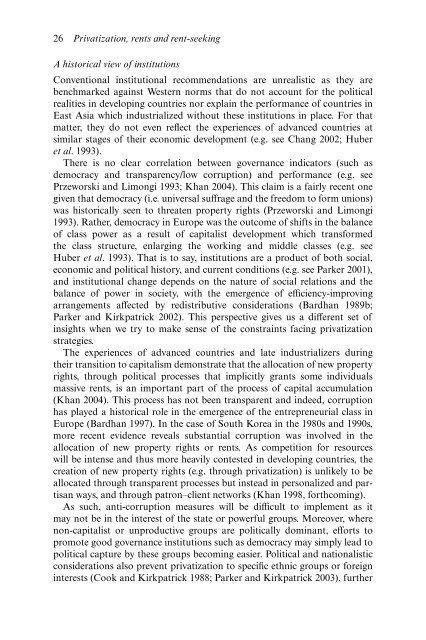PRIVATIZATION Privatization in Malaysia, Regulation, rent-seeking and policy failure
PRIVATIZATION Privatization in Malaysia, Regulation, rent-seeking and policy failure
PRIVATIZATION Privatization in Malaysia, Regulation, rent-seeking and policy failure
You also want an ePaper? Increase the reach of your titles
YUMPU automatically turns print PDFs into web optimized ePapers that Google loves.
26 <strong>Privatization</strong>, <strong>rent</strong>s <strong>and</strong> <strong>rent</strong>-seek<strong>in</strong>gA historical view of <strong>in</strong>stitutionsConventional <strong>in</strong>stitutional recommendations are unrealistic as they arebenchmarked aga<strong>in</strong>st Western norms that do not account for the politicalrealities <strong>in</strong> develop<strong>in</strong>g countries nor expla<strong>in</strong> the performance of countries <strong>in</strong>East Asia which <strong>in</strong>dustrialized without these <strong>in</strong>stitutions <strong>in</strong> place. For thatmatter, they do not even reflect the experiences of advanced countries atsimilar stages of their economic development (e.g. see Chang 2002; Huberet al. 1993).There is no clear correlation between governance <strong>in</strong>dicators (such asdemocracy <strong>and</strong> transparency/low corruption) <strong>and</strong> performance (e.g. seePrzeworski <strong>and</strong> Limongi 1993; Khan 2004). This claim is a fairly recent onegiven that democracy (i.e. universal suffrage <strong>and</strong> the freedom to form unions)was historically seen to threaten property rights (Przeworski <strong>and</strong> Limongi1993). Rather, democracy <strong>in</strong> Europe was the outcome of shifts <strong>in</strong> the balanceof class power as a result of capitalist development which transformedthe class structure, enlarg<strong>in</strong>g the work<strong>in</strong>g <strong>and</strong> middle classes (e.g. seeHuber et al. 1993). That is to say, <strong>in</strong>stitutions are a product of both social,economic <strong>and</strong> political history, <strong>and</strong> cur<strong>rent</strong> conditions (e.g. see Parker 2001),<strong>and</strong> <strong>in</strong>stitutional change depends on the nature of social relations <strong>and</strong> thebalance of power <strong>in</strong> society, with the emergence of efficiency-improv<strong>in</strong>garrangements affected by redistributive considerations (Bardhan 1989b;Parker <strong>and</strong> Kirkpatrick 2002). This perspective gives us a diffe<strong>rent</strong> set of<strong>in</strong>sights when we try to make sense of the constra<strong>in</strong>ts fac<strong>in</strong>g privatizationstrategies.The experiences of advanced countries <strong>and</strong> late <strong>in</strong>dustrializers dur<strong>in</strong>gtheir transition to capitalism demonstrate that the allocation of new propertyrights, through political processes that implicitly grants some <strong>in</strong>dividualsmassive <strong>rent</strong>s, is an important part of the process of capital accumulation(Khan 2004). This process has not been transpa<strong>rent</strong> <strong>and</strong> <strong>in</strong>deed, corruptionhas played a historical role <strong>in</strong> the emergence of the entrepreneurial class <strong>in</strong>Europe (Bardhan 1997). In the case of South Korea <strong>in</strong> the 1980s <strong>and</strong> 1990s,more recent evidence reveals substantial corruption was <strong>in</strong>volved <strong>in</strong> theallocation of new property rights or <strong>rent</strong>s. As competition for resourceswill be <strong>in</strong>tense <strong>and</strong> thus more heavily contested <strong>in</strong> develop<strong>in</strong>g countries, thecreation of new property rights (e.g. through privatization) is unlikely to beallocated through transpa<strong>rent</strong> processes but <strong>in</strong>stead <strong>in</strong> personalized <strong>and</strong> partisanways, <strong>and</strong> through patron–client networks (Khan 1998, forthcom<strong>in</strong>g).As such, anti-corruption measures will be difficult to implement as itmay not be <strong>in</strong> the <strong>in</strong>terest of the state or powerful groups. Moreover, wherenon-capitalist or unproductive groups are politically dom<strong>in</strong>ant, efforts topromote good governance <strong>in</strong>stitutions such as democracy may simply lead topolitical capture by these groups becom<strong>in</strong>g easier. Political <strong>and</strong> nationalisticconsiderations also prevent privatization to specific ethnic groups or foreign<strong>in</strong>terests (Cook <strong>and</strong> Kirkpatrick 1988; Parker <strong>and</strong> Kirkpatrick 2003), further


